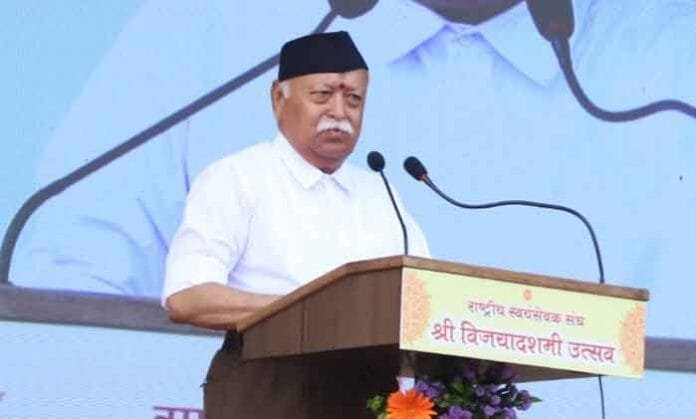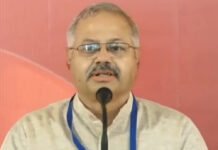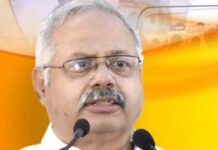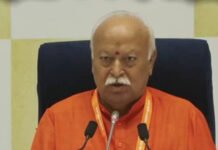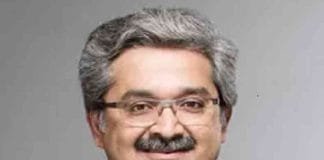INVC NEWS
Nagpur : In a powerful address on the occasion of Dussehra, Mohan Bhagwat, the Chief of the Rashtriya Swayamsevak Sangh (RSS), highlighted several pressing concerns for India by citing the current situation in Bangladesh. He warned of a growing ideological conflict targeting India’s unity and sovereignty, referred to as a ‘Mantra Revolution’ (मंत्र विप्लव). This subtle yet insidious process seeks to fracture India’s social fabric by turning its diversity into division, encouraging societal clashes, and undermining national institutions.
Bhagwat’s speech was more than just a cautionary note; it was a profound call to action, urging the people of India to be aware of these external and internal threats. The intent behind the speech is clear — to ensure that Indian society remains united and vigilant against divisive forces that seek to weaken the country from within.
Bangladesh as a Cautionary Tale: A Warning for India
In his address, Bhagwat took Bangladesh as an example to illustrate the dangers that lie ahead. He pointed out that the violent incidents targeting Hindus in Bangladesh were not isolated events. These acts of aggression against minority communities are part of a larger pattern driven by a radical mindset that uses the weakness of others as an excuse for oppression. Despite the organized efforts by the Hindu community in Bangladesh to defend itself, the threat remains imminent.
Bhagwat also emphasized that it is imperative for the Hindu diaspora and the Indian government to extend their support to the vulnerable Hindu community in Bangladesh. The only way to prevent further atrocities is to remain strong and united. Bhagwat’s message here is twofold: to deter violence through solidarity and to ensure that India, as a nation, is prepared to defend itself.
The ‘Mantra Revolution’: A Silent Yet Dangerous Threat
A critical part of Bhagwat’s speech was his exposition of the term ‘Mantra Revolution.’ This phrase, coined by Bhagwat, refers to a covert strategy employed by certain external and internal forces to destabilize a nation. According to Bhagwat, the goal of these forces is to create an atmosphere of discontent, disrespect for authority, and chaos, which makes it easier for outside powers to exert control.
The process begins by turning society’s diversity into division. In a country as culturally rich as India, diversity is often seen as its greatest strength. However, Bhagwat cautioned that this diversity could be manipulated into creating fractures, pitting different sections of society against one another. The ultimate aim is to sow discord and foster a climate of suspicion and hostility. Once this climate takes root, the respect for authority, law, and national institutions begins to erode, paving the way for external forces to exploit the situation.
Bhagwat urged the citizens of India to be wary of this hidden revolution and to remain vigilant against any attempt to divide the nation. He stressed that the defense against this threat is not violence but strength and unity.
External Threats: India as a Target of Geopolitical Manipulation
Mohan Bhagwat also pointed out that there is an ongoing narrative in Bangladesh that seeks to portray India as a threat. He mentioned that some political forces in Bangladesh believe that aligning with Pakistan would help them resist India’s influence. This narrative is alarming, especially considering India’s significant role in the formation of Bangladesh during the 1971 war for independence.
Bhagwat questioned the motives behind this anti-India sentiment and suggested that it serves the interests of foreign powers seeking to weaken India’s standing in the region. He alluded to the fact that these divisive ideas are not confined to Bangladesh but are also circulating within India, propagated by certain groups that seek to undermine India’s unity from within.
The Cultural and Ideological Battle: A Fight for India’s Identity
A significant portion of Bhagwat’s speech was dedicated to the cultural and ideological battle being fought within India. He identified certain movements such as Cultural Marxism and Wokeism as threats to the nation’s traditional values. These ideologies, according to Bhagwat, seek to take control of academic and intellectual institutions and distort the mindset of the people by undermining their respect for their own heritage.
Bhagwat emphasized that there is a concerted effort to infiltrate educational institutions and promote ideas that belittle Indian culture and traditions. He warned that these attempts to distort the perception of India’s history and values could lead to a weakening of the nation’s cultural foundation. He referred to this as an effort to create intellectual confusion and cultural degradation, a strategy that ultimately aims to divide the society and make it easier for external forces to take control.
A Call for Unity and Strength
In his closing remarks, Mohan Bhagwat called for India to remain strong, united, and aware of the forces that seek to divide it. He urged the citizens to resist violence but remain vigilant and organized. Bhagwat’s message was clear: only through unity and strength can India withstand the threats it faces, both from within and from outside its borders.
He also emphasized the need for self-reliance and empowerment. Bhagwat’s speech was not just a warning, but a call to action, encouraging every Indian to contribute to the nation’s defense against ideological and cultural infiltration.

